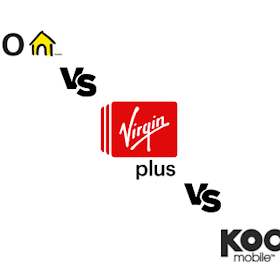
If you've made the decision to let your child have their own phone, you might be facing the task of figuring out what kind of plan would be best for their needs. It’s no secret that when it comes to money (in particular, their parents' money) kids don’t always make the smartest decisions, which is why it’s so important to make the right choice concerning a potentially costly investment like a phone - especially if you’ll be footing the bill.
We’ve come up with some tips for finding a plan that best suits the needs of your child (and your wallet), and offered a few suggestions to help you narrow it down.
Questions to ask before deciding on a plan
Before you go rushing out to buy the latest and most expensive smartphone on a top tier plan, there are several things you need to consider.
- What will they be using it for? Younger children will just need a way of contacting parents in an emergency, and a means for parents to contact and locate them. A game or two couldn't hurt, either. Tweens will probably want to be able to text and call their friends as well as family. Instant messaging (IM) platforms may also be a factor. Teens and older will want to be able to access social networks, browse the web, take pictures, and watch video, as well as contact friends. All modern smartphones have GPS capability, so getting lost shouldn't be too much of an issue.
- For older children – which provider are their friends with? Some networks will offer free talk and text between customers, so in this case going with the crowd could save you a lot of money (so long as you'll receive good network coverage in your area).
- Which handset has the features you’ll need? Smaller children don’t need smartphones – a basic cell is enough. If you have a leftover smartphone of your own, consider putting some kind of parental control locks on it before placing a modern, unfiltered browsing powerhouse in their little hands. Are your children likely to pester for an upgrade to the latest and greatest device? This could be a problem if you get locked into a contract, so BYO Phone monthly plans may be a better option. And if your child has a track record of not exactly being responsible with their possessions, getting the coolest and costliest new phone on a contract is only going to lead to trouble.
- Who will be paying for it? Prepaid plans can help teach teens the value of money if they pay for it themselves. The biggest benefit of prepaid is no nasty bill shock at the end of the month – you pay for your calls, texts and data use in advance, so it’s perfect for youngsters learning how to budget, or parents wanting to avoid bill-related heart attacks. However, keep in mind that when prepaid credit runs out your child won't be able to call you.
- Can you change your mind? Before getting locked into a contract, it's best to consider what it will cost you to switch or cancel the plan if it's not meeting the needs of your child. Monthly plans with no fixed term are often more economical, as they allow flexibility without slugging you with extra fees.
- For post-paid plans - what charges apply if your child exceeds their limit? Although we don't recommend an individual post-paid plan for children and teens, because of how easy it can be to run up costly additional charges to the monthly minimum cost, if you are looking at this option it's important to compare call, text and data costs as these can vary between carriers - although many plans now come with unlimited local or nation-wide calls and texts.
Family and mobile share plans
Many parents find it easier and more convenient to keep the whole family on one cell phone account. Shared Plans often include unlimited local calls, unlimited messaging and a shareable pool of data, with pricing depending on how much data you need and how many lines you'd like to add to your account.
Adding your children to your plan through this method means you'll receive one monthly bill for the whole family, and save money compared to signing up for multiple individual plans.
While not all providers offer shared plans, you'll find big carriers have family/shareable data options. Telus' family plan discount will help you save $15/month when you share a plan between two people; $30/month when its shared between three people; and $60/month or higher if you share your plan with four or more people.
Rogers' Share Everything plans start at $80 per month BYOP for 500MB of shared data and unlimited Canada-wide minutes and messaging. There are a variety of data allocation options right up to 30GB.
Next is Bell, which lets you add members to your account and save $20-60/month depending on how many lines are sharing your plan.
Prepaid plans
Prepaid plans are an ideal option for teens who'll be paying for their cell themselves, or parents wanting to avoid the stress of unexpected charges appearing on their monthly bill. Monthly plans can start at around $10 a month and go up to the more top tier unlimited plans, where you'll be looking at $80 - $100 monthly depending on how much data your teen requires (or demands).
Most carriers also have the option of pay-as-you-go deals where customers only pay for the minutes, texts and web browsing that they actually use, although you'll usually find that the value of each call, message or megabyte is inflated compared to buying in blocks through regular plans. These are probably best to avoid for teens, who can have a tendency to download, text, and call first, and think later.
However, if you're allowing your child access to a cell solely as a means of contacting you, and not talking and texting friends or playing on Facebook, this may be more suitable than a plan where you're paying for more minutes than your kids will use.
The other benefit of prepaid plans is that many are available without needing to sign up to a long-term contract - you can cancel any time without incurring penalties. And many prepaid offers are also bring your own phone(BYOP), so instead of shelling out for a new cell for your son or daughter, parents are able to connect a hand-me-down phone to a prepaid plan. Just make sure any phone you give them is not locked to a different network before signing them up to a new carrier.
Prepaid plans to consider
If you're looking for affordable prepaid plans, you may be better off avoiding the big carriers. Parents who just want good talk and text options for kids, without a ton of data, should look at 7-Eleven SpeakOut Value Plans, which can have calls, text, data, or a mixture of all three.
Things to remember before you decide:
- Depending on your province or territory, your child must be 18 or 19 before they can sign a contract, so chances are the phone will be in your name. That means that large bills and missed payments are legally your responsibility; be careful if you decide on a post-paid plan.
- Be wary of premium content, such as downloading ringtones or games or sending texts to promotional services - they’re charged at a much higher rate than standard texts and downloads and are often not covered by plan inclusions.
- For smartphones running applications such as games: be aware that allowing apps to run in the background, or enabling automatic notifications for things such as Facebook or email, uses up both data and battery life. You can always disable automatic notifications through the 'Settings' option on your child's phone.
Toddler with phone image via Shutterstock
Related Articles
Find Better Phones and Plans
Hundreds of cell phone plans unpacked. All the facts. No surprises.








































